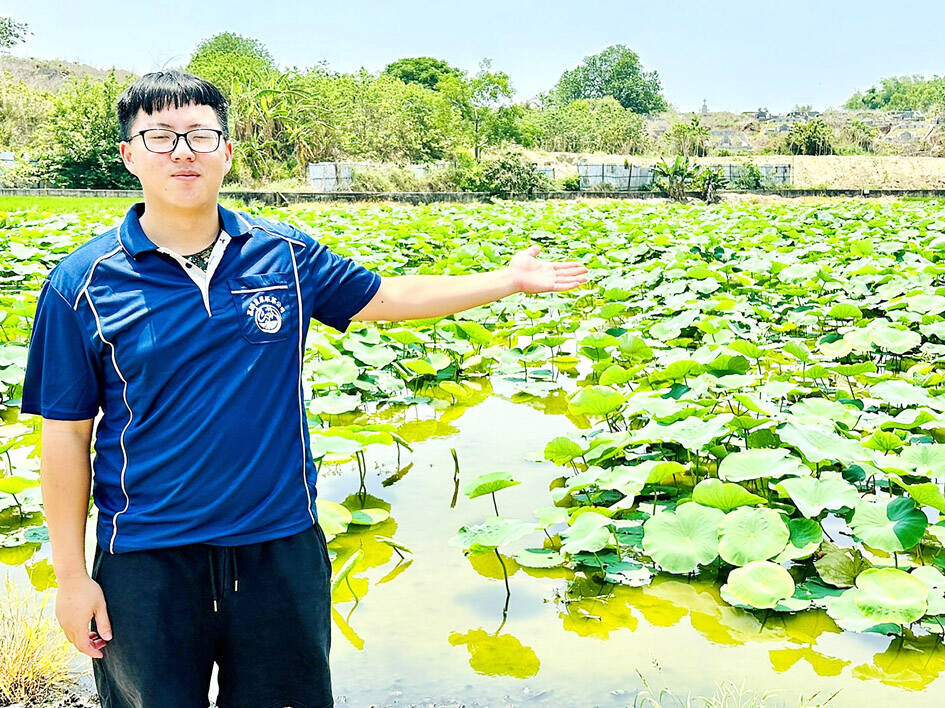A documentary about lotus farmers in Chiayi County has inspired a new generation to take root in the industry.
“Who would have imagined that this twilight industry not only did not disappear, but is now flourishing,” director Lai Li-chun (賴麗君) said of finding that her hometown’s staple crop is making a comeback thanks to her film.
Niutoushan (牛斗山) in Chiayi’s Minsyong Township (民雄) was once Taiwan’s largest producer of lotus roots, a favorite among Japanese consumers.

Photo: Tsai Tsung-hsun, Taipei Times
Moved by seeing the gnarled hands of the elderly farmers in her village after decades of digging up the deep roots, Lai decided to shoot a documentary to learn more about their lives.
In collaboration with filmmaker Peng Chia-ju (彭家如), Lai spent more than four years putting together Eagle Hand (老鷹之手).
The film in May 2021 won three awards at the Cannes World Film Festival, which is unaffiliated with the Cannes Film Festival — for Best Documentary Feature, Best Female Director and Best Cinematography.
Lai said her original intention was to document a waning industry.
Yet in the years since she began filming, the amount of land under cultivation has expanded to 70 hectares from 40 hectares, Lai said.
There are also many young people coming in to learn the trade, even without coming from farming backgrounds, to start a new foundation for their families, she added.
Lai said she was even more surprised to learn that many are still teenagers.
Some are the children of migrant workers who came to the profession as the only way to start their own businesses, she said.
Lai said all of this has made her believe that lotus farming is not a twilight industry, but the greatest gift their ancestors could have given to the village, capable of granting younger generations a chance to settle roots.
Tsai Chia-hao (蔡家豪) and Lee Chia-chun (李嘉俊) are the two founders of Chia Sheng, an agricultural product and marketing firm that seeks to help other new lotus farmers like themselves.
The two 21-year-olds have recruited about a dozen others, with an average age of only 20.
With 10 hectares under cultivation, they have a goal of earning more than NT$1 million (US$32,525) per person in the hope of attracting more people to join the industry.
Harvesting lotus roots from the marshy ground where they grow 30cm to 40cm deep is exhausting, Tsai said.
Farmers must rely on their perseverance to continue, he said, adding that every dollar is hard earned.
Demand is high and supply is low for lotus roots in Taiwan, Lee said, adding that if the labor issue can be solved, it could transform from a declining into a niche industry.

Chinese Nationalist Party (KMT) Chairman Eric Chu (朱立倫), spokeswoman Yang Chih-yu (楊智伃) and Legislator Hsieh Lung-chieh (謝龍介) would be summoned by police for questioning for leading an illegal assembly on Thursday evening last week, Minister of the Interior Liu Shyh-fang (劉世芳) said today. The three KMT officials led an assembly outside the Taipei City Prosecutors’ Office, a restricted area where public assembly is not allowed, protesting the questioning of several KMT staff and searches of KMT headquarters and offices in a recall petition forgery case. Chu, Yang and Hsieh are all suspected of contravening the Assembly and Parade Act (集會遊行法) by holding

PRAISE: Japanese visitor Takashi Kubota said the Taiwanese temple architecture images showcased in the AI Art Gallery were the most impressive displays he saw Taiwan does not have an official pavilion at the World Expo in Osaka, Japan, because of its diplomatic predicament, but the government-backed Tech World pavilion is drawing interest with its unique recreations of works by Taiwanese artists. The pavilion features an artificial intelligence (AI)-based art gallery showcasing works of famous Taiwanese artists from the Japanese colonial period using innovative technologies. Among its main simulated displays are Eastern gouache paintings by Chen Chin (陳進), Lin Yu-shan (林玉山) and Kuo Hsueh-hu (郭雪湖), who were the three young Taiwanese painters selected for the East Asian Painting exhibition in 1927. Gouache is a water-based

Taiwan would welcome the return of Honduras as a diplomatic ally if its next president decides to make such a move, Minister of Foreign Affairs Lin Chia-lung (林佳龍) said yesterday. “Of course, we would welcome Honduras if they want to restore diplomatic ties with Taiwan after their elections,” Lin said at a meeting of the legislature’s Foreign Affairs and National Defense Committee, when asked to comment on statements made by two of the three Honduran presidential candidates during the presidential campaign in the Central American country. Taiwan is paying close attention to the region as a whole in the wake of a

OFF-TARGET: More than 30,000 participants were expected to take part in the Games next month, but only 6,550 foreign and 19,400 Taiwanese athletes have registered Taipei city councilors yesterday blasted the organizers of next month’s World Masters Games over sudden timetable and venue changes, which they said have caused thousands of participants to back out of the international sporting event, among other organizational issues. They also cited visa delays and political interference by China as reasons many foreign athletes are requesting refunds for the event, to be held from May 17 to 30. Jointly organized by the Taipei and New Taipei City governments, the games have been rocked by numerous controversies since preparations began in 2020. Taipei City Councilor Lin Yen-feng (林延鳳) said yesterday that new measures by